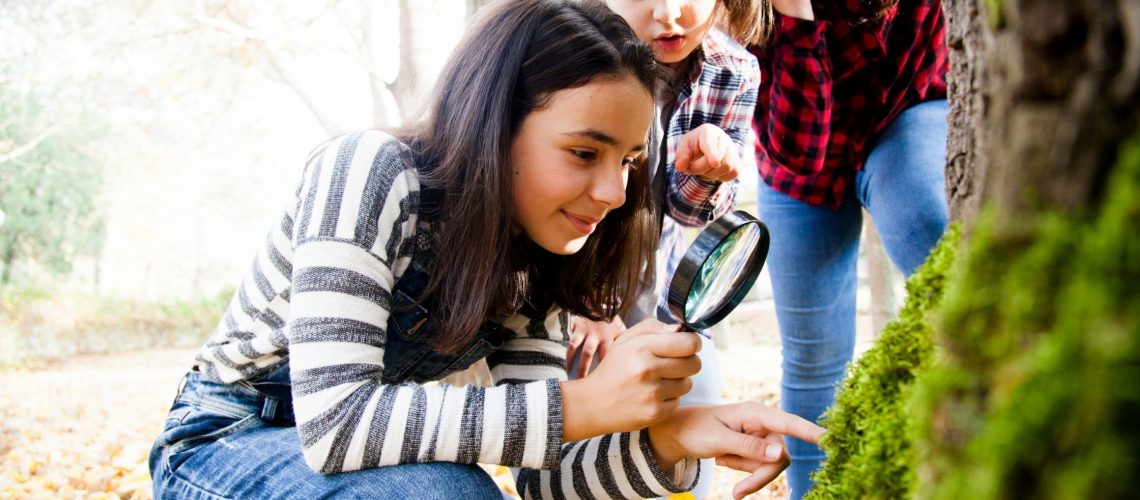By ALB, MD-PhD
Learning through exploration in nature schooling
Nature schooling is one of the best curriculums. The leaves are falling slowly through the trees. Sunlight filters gently to the ground. A zephyr whips quickly past. The juxtaposition of the gentleness, light, and force of nature are some of the best aspects of spending time outdoors with children. My kids love to be outside, and we emphasize nature time as the most important time during the week. They learn plenty of reading, writing, and math basics without a great deal of effort, which leaves us with ample time to explore outside. Personally, I do not emphasize heavy loads of curriculums and desk time. (We do spend lots of time reading library books, though!) This approach of mainly nature schooling may change as they get older but works well for now.
My main focus is carving out time to explore outside. Children instinctively gravitate toward nature if given the opportunity. They love to dig in the dirt, watch worms, discover grubs, and follow ants. The patterns of these creatures provide an example of hard work, good habits, and teamwork. The ants are constantly working hard and working together to maintain their well-ordered homes. The kids also learn to respect boundaries as the ants will always defend themselves. When they kick ant piles, I tell the kids that they should expect to be bitten since the ants are simply defending their homes. Thus, they learn not to kick anthills!
Ants alone can provide copious amounts of material to discuss the animal kingdom, insect habits, habitats, and roles in our environment. For example, my kids recently discovered a fascinating nest among some tall prairie grass in our neighborhood. In a marvel of insect engineering, the ants had carefully built the entrance to their nest almost a foot off the ground using live grass leaves that are long and thin. The kids and I were amazed that the ants could make their home so tall. The children saw clearly that ants are very intelligent and can use plant structures around them to design different types of nests. Now we actively look for big anthills to relive the excitement of finding that first fascinating nest.
An addiction to nature schooling
As humans, we are constantly seeking new interactions and crave positive reinforcement so that dopamine is released, giving us positive and rewarding feelings. This can definitely occur while interacting with nature, and we can truly encourage a nature “addiction,” so to speak.
I grew up with a mix of city and farm life and was “addicted” to nature from a young age. There was nothing more enjoyable than digging my feet in the dirt, playing in the mud head-to-toe, and watching creatures big and small. My parents allowed my emerging sense of curiosity to grow in this idyllic setting, and I seek to pass on this growth-in-nature treatment to my children. Eventually, growth and maturity will lead curiosity to transform into deep-seated questions and intense searches for answers. This is why taking time to watch nature and to experience it hands-on is so important.
Nature: A natural place to learn
Kids learn a great deal by simply taking a walk through naturally growing areas and interacting with the fauna and flora around them. Some plants provide excellent tools for building, while others are to be avoided. Children learn that exploring nature in dangerous ways can have nasty consequences, so they learn to be wary of areas off of the trail. Poison ivy is prevalent where we live, and we have to be vigilant to look for and avoid it. My eldest child knows the leafy trio well and is very careful to look for it. My younger children are still learning, and I have to remind them frequently to stay away from certain areas. The respect they learn for these unique poisonous plants can be translated into a science lesson.
Take time to smell the roses… and learn from them!
Kids can be taught that plants have all sorts of defenses, and some affect people in significant ways. The poison ivy oils serve a purpose, and the kids can be encouraged to figure out what that purpose is. In this case, a lesson about plant defenses and chemical products can greatly enhance a child’s view of the dynamic and active way that plants respond to their environment. Of course, the flip side of poisonous plants is the plants that invite us to be near them. Lavender, rosemary, thyme, and basil have wonderful fragrances that encourage people to interact with them. (Note: As with all plants, touching, smelling, and tasting must be carefully monitored with extreme caution by adults because some plants that look nice are definitely poisonous!)
Finding enticing plants encourages straying from the path, which can be a very positive experience as long as children are taught to look carefully for the dangerous plants. These times for venturing off the path provide unique and exciting experiences in safe areas.
We have enjoyed some of our best off-path experiences in wide-open, grassy areas that give kids room to run, explore, and build. My kids often like to make shelters with other kids, testing different materials and learning how to build viable structures. This is a great group activity that requires little to no help from parents.
Overall, the benefits of nature exploration are multitudinous. Enabling kids to explore and chart their own course freely gives parents a much-needed break from constantly planning and preparing activities for them. Families that explore nature will come away with a sense of calm and well-being. I encourage families to sit back, relax, and let their children learn naturally in nature!

